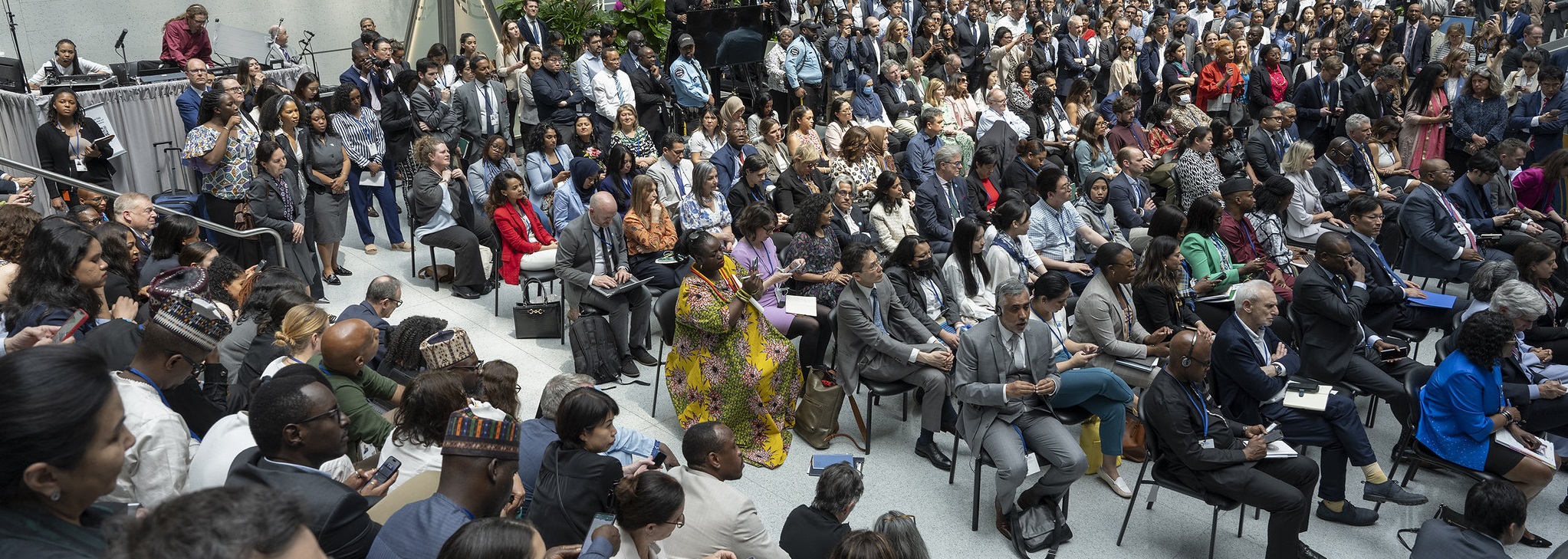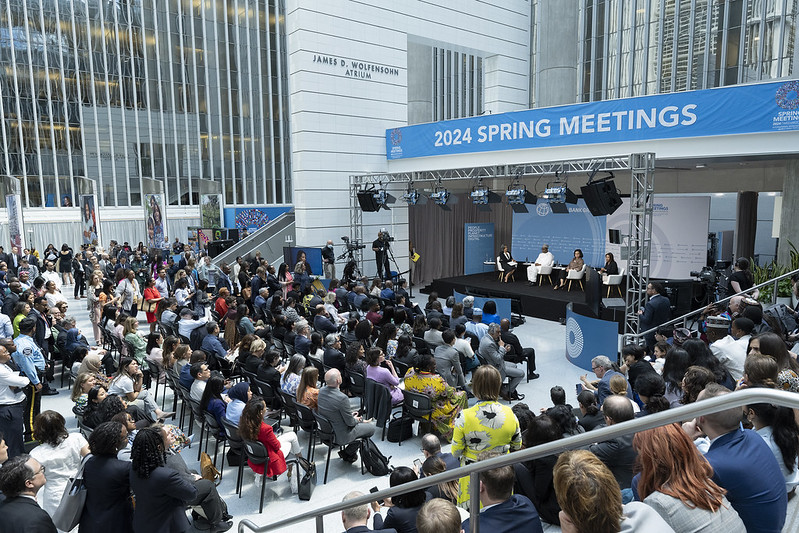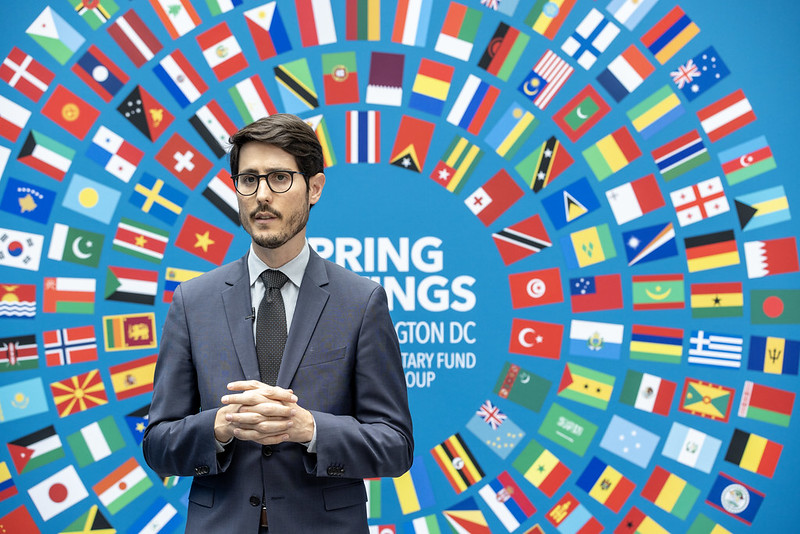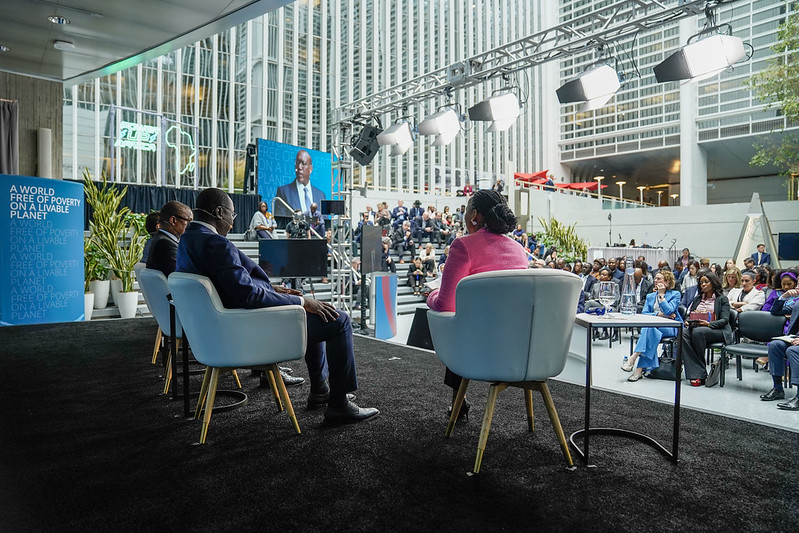
Members of the Max Thabiso Edkins Climate Ambassador Class of 2024 had the chance to immerse themselves in this year’s World Bank/IMF Spring Meetings, which recently concluded. The young ambassadors are delighted to share their notes and observations on these vital dialogues — you’ll find them compiled below.
We begin with Bangladesh’s Allin Mohana Biswas, whose focus in the climate movement is on youth leadership, education and participation.
I was excited to attend the Spring Meetings because I wanted to get insights from those immersed in addressing socioeconomic and environmental challenges firsthand.
Through my youth organization, Global Gatekeepers, we equip young Bangladeshis with the leadership skills, practical abilities, and networking opportunities they need to thrive and create positive change. Bangladesh's youth population is increasing, but job creation hasn't kept pace. This challenge is amplified by Bangladesh's graduation from Least Developed Country status, which necessitates a shift in the types of jobs available.
I therefore attended the Spring Meetings session titled “Knowledge Cafe: Unlocking Potential: Creating Jobs for the Poorest,” which cemented my view that, in order to combat poverty, policymakers need to work hand-in-hand with grassroots organizations. While cash transfers offer some relief, they're not a long-term solution. The nature of work is constantly evolving alongside advancements in technology and societal shifts.
Our job market needs to keep pace by offering opportunities that are relevant and equip young people for the future. Expanding access to financial services is crucial for breaking the cycle of poverty. This includes building a network of institutions that empower low-income individuals to save, invest, and gain financial literacy.

Photo credit: Grant Ellis / World Bank
Next up is Osman Kocini, a Cypriot climate ambassador living in London, England.
I work as a sustainability consultant, focusing on mitigation and adaptation strategies in sectors including energy, transport and infrastructure. I am an ardent believer in the role of the built environment in driving inclusive and sustainable growth, where stakeholders can collaborate and learn from one another.
I was excited to attend the 2024 Spring Meetings to hear from World Bank and IMF leaders on their highlights, ongoing projects, investment products and visions for a sustainable future. Throughout the week, I attended several sessions, ranging from climate finance to energy transition to utilities, as well as various Knowledge Cafes showcasing cutting-edge tools developed by the World Bank experts and guest speakers.
Here are two of the moments that resonated most with me:
1. “Digital Solutions for Climate Action”
This session introduced and demonstrated two digital tools developed by the World Bank: the Climate Change Knowledge Portal and the Global Food and Nutrition Security Dashboard. As someone well-versed in sustainability and climate, I was particularly excited and impressed by the Climate Change Knowledge Portal, an online tool providing open-access data on historical and future climate impacts, vulnerabilities and risks, filterable down to the country level via an intuitive user interface. Precise geospatial information, country-specific risk profiles and wide-ranging translation options will empower policymakers local and national, development practitioners, NGOs and international organizations alike, democratizing climate action and governance.
Given my professional experience working with IFC Environmental and Social Standards on infrastructure projects, I see this tool’s potential to be very useful in identifying climate risks in specific lender-funded infrastructure investments in different geographical locations. The Climate Change Knowledge Portal has the potential to become an integral part of impact assessments and disclosure requirements at the project level — as well as at local, regional and national scales.
2. “Climate Voices: Working Together — Lessons from Costa Rica and Kenya”
This session focused on climate finance and the IMF’s Resilience and Sustainability Fund (RSF), which empowered governments, multilateral organizations and private organizations in Costa Rica and Kenya to cooperate on a legal framework for climate adaptation and enhance climate resilience and institutional capacity to tackle challenges.
To date, 18 country-specific RSF arrangements have been approved by the IMF, with loans and financial products amounting to over 8 billion USD. There are several success stories, with Kenya perhaps the most notable. Kenya is the first African country to implement a legal framework to tackle climate change, and it has been effective in utilizing internal and external financial resources to decarbonize high-impact sectors such as energy, transport and agriculture.
Approved in 2023 for Kenya, RSF has been a key catalyst of these reform efforts. Through active collaboration with the World Bank and IMF, the Kenyan government has incorporated climate risk into its financial risk frameworks and has initiated a shift from emergency response to disaster risk reduction, with sector-specific resilience strategies in place for water, energy and agriculture. Kenya is now setting a valuable example as a leader on climate action in Africa.
I emerged from the Spring Meetings with a newfound sense that it is possible for multilateral organizations and communities (including young people) to work harmoniously toward climate action and positive socioeconomic impacts — given effective management and coordination.

Photo credit: Simone D. McCourtie / World Bank
Now, let’s hear from Joshua Gabriel Oluwaseyi, a Nigerian climate ambassador and storyteller.
My focus in the climate movement is storytelling for inclusive climate action. I lead Our African Climate Story, giving young climate leaders from across Africa the tools needed to tell their climate stories effectively, empowering them to influence policies and inspire communities to take climate action.
I was excited to attend the World Bank Spring meetings because I wanted to gain insight into some of the most pressing issues under discussion at the highest level. The Meetings provided me first-hand access to amazing African innovators like Ms. Folake Soetan, who spoke at the “Power of Utilities for the Energy Transition” Knowledge Cafe session.
Energy has always been a big issue for Nigeria, and the energy transition discourse has always felt distant to us. I myself, for instance, grew up in (and still live in) a household reliant on gas and diesel generators for power. As someone allergic to air pollutants yet made to endure near-direct exposure to my allergy triggers due to the lack of affordable alternatives, this session particularly resonated with me.
Its focus was the need for a transformation in the electricity sector to concurrently cut back on carbon emissions and ensure universal access — a double challenge. Achieving this will necessitate connecting some 700 million new users and adding roughly 2,000 gigawatts of renewable energy in low- and middle-income countries over the next 5 years.
Ikeja Electric is setting a fine example, growing its customer base while achieving coveted safety and other certifications worldwide. It has deployed smart meters, made usage and pricing data transparent, and debuted electronic billing in Nigeria. However, investment in Nigeria’s electrical infrastructure is still lacking overall — securing funds and directing them where they’re needed continue to pose major challenges.
How do we move forward? There are targets that desperately need to be met, and I believe donors, governments, regulators, utility managers and other key stakeholders need to prioritize collaboration. Partnerships are the only way we’ll be able to effectively decarbonize at scale, increasing the share of renewables while shoring up supply security within the system.

Photo credit: Riccardo Savi / World Bank
Finally, climate ambassador Dr. Wais Ahmad, from Afghanistan, offers his perspective.
My focus in the climate movement is advocating for sustainable healthcare practices and resilience in vulnerable communities. As a climate activist, I am deeply aware of the interconnectedness between climate change and public health. Many diseases are exacerbated or triggered by climate-related factors, and addressing climate change is crucial to safeguarding both the mental and physical health of populations worldwide.
I was excited to attend the World Bank Group Spring Meetings for the opportunity to engage with experts in the fields of public health and universal health coverage (UHC). As someone deeply committed to addressing global health challenges, I was eager to learn about innovative strategies for expanding healthcare access and improving health outcomes worldwide.
Here are the events I attended, and the insights I gleaned from each:
1. Panel Discussion on Collaborative Efforts for UHC
This session resonated with me because it highlighted the importance of partnerships between governments, civil society and the private sector in driving healthcare reforms and expanding services. As a healthcare professional and climate activist, I recognize the critical role of collaboration in addressing the health impacts of climate change and advancing sustainable healthcare solutions.
2. Presentation on Timely Interventions in Healthcare
Dr. Chidinma S. Ononogbu’s insights into the importance of timely ambulance service struck a chord with me. In underserved communities, access to emergency medical services can be life-saving, and I believe investing in such interventions is crucial to mitigating the health impacts of climate-related disasters and extreme weather events.
3. Discussion on Local Pharmaceutical Manufacturing
Lamia Tazi’s discussion on the success of local pharmaceutical manufacturing in Morocco resonated with me deeply. As someone from Afghanistan, where essential medicines are often all too hard to come by, I see the importance of local production in enhancing healthcare accessibility and resilience, especially in the face of climate-related disruptions to global supply chains.
On the whole, attending the World Bank Group Spring Meetings provided me with valuable insights into the importance of collaborative action, timely interventions, and local solutions in advancing universal health coverage and addressing global health challenges exacerbated by climate change. I am inspired to continue advocating for sustainable healthcare practices and resilience-building efforts in vulnerable communities, leveraging partnerships and innovative strategies to achieve lasting impact.
Thank you for reading! We hope you’ve enjoyed the insights of these amazing Max Thabiso Edkins Climate Ambassadors. We’ll be back next year with further Spring Meetings coverage.
Banner image courtesy of Grant Ellis / World Bank.



